I’m struggling over here…
I thought I could say that it all started with the plant based prevention of disease conference two weekends ago. But I don’t think that’s true. I signed up for the conference to get my required in-person continuing medical education credits I need to sit for the American Board of Lifestyle Medicine exam this fall. And I knew in advance it would be all about plant based living, but I started to get an inkling that there was more coming when I got an email requesting that I bring my own reusable cup, plate, and utensils in an effort to achieve zero waste during the conference meals. Now, I’ve been recycling and conserving water and trying to reduce my eco-footprint for years, so I got on board and packed a plate and flatware.
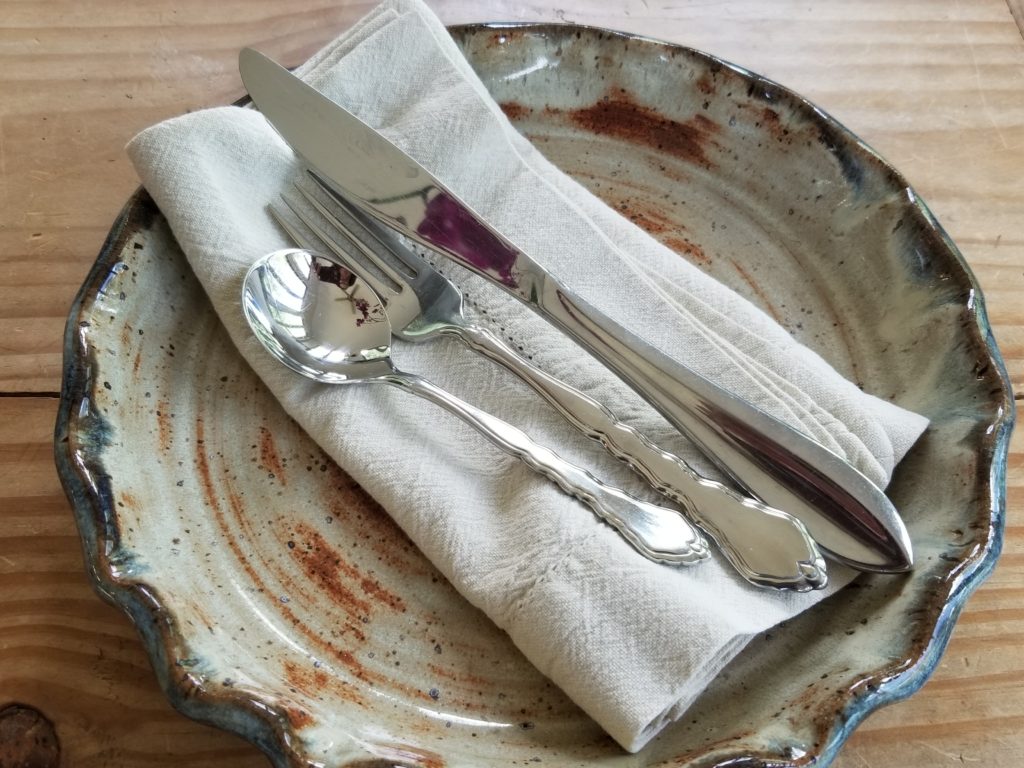
The beginning of the conference was a challenge. The first few lectures had the tone of a vegan infomercial. Honestly, one of the reasons I have never called myself a vegan (even when I was eating that way) is because of the way that some people who wear the title confer judgement on those who do not. Now, I’m not saying everyone who eats vegan is the same as an ethical vegan, nor is there anything wrong with being an ethical vegan. But in a room full of health professionals and experts, I was irritated that the conference started with a tone of superiority and “of course a vegan diet is the best for all humans”. Now, that concept is up for discussion, but learning more about Plant Based prevention of disease was the point of the conference. Having to wade through judgement just pissed me off. I think this may be why many people resist eating vegan. In order to get to the place where you are willing to evaluate what you’re doing and consider changing, you need to feel acceptance and consideration. Feeling judged (in anything) just makes people resistant – which means they don’t even consider changing, even if it really is a good idea.
As the conference progressed, there were some excellent lectures on the scientific evidence behind a whole foods, plant based diet, the ethical and racial implications of eating this way, and the environmental impact of eating animal foods. This is where things started to get sticky for me. I’ve been eating mostly plants for awhile, but since I’ve also been eating low carb, it’s been easier to get my protein from eggs or meat. I also haven’t tried to feed my family a plant based diet – I’d buy as much organic and local as possible and sometimes skip the meat myself. I knew about the industrial meat industry, the animal cruelty and unsanitary conditions that contribute to food contamination and recalls of both plant and animal foods. I stopped eating at chain restaurants that didn’t serve local farmed meat.
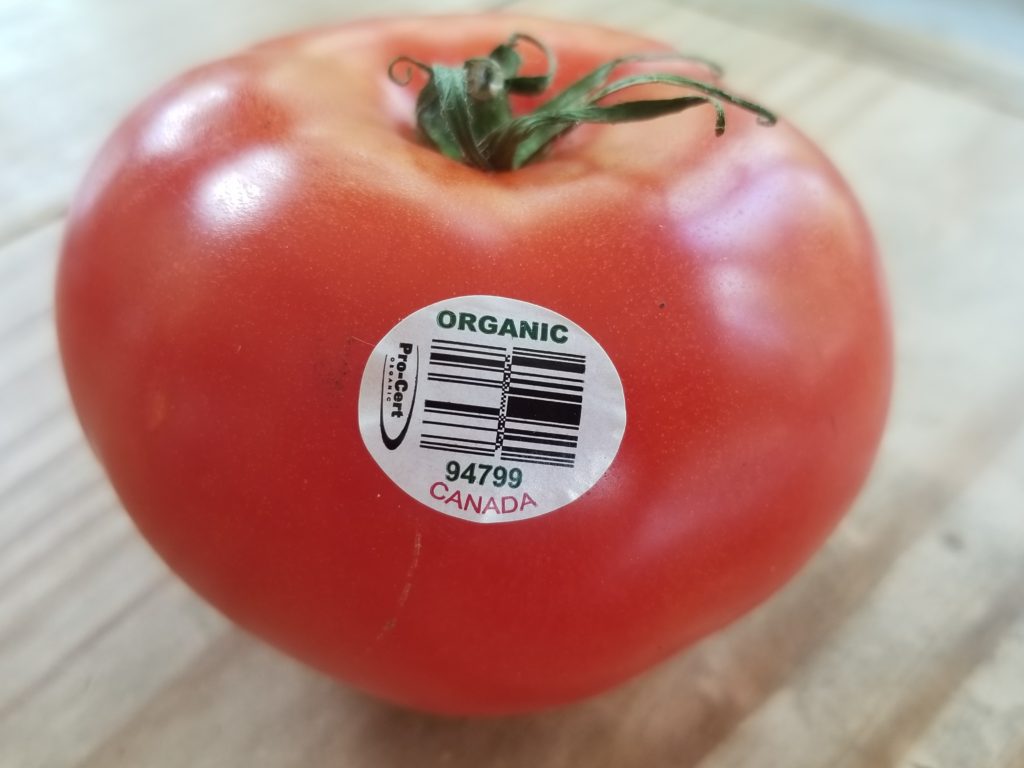
What I didn’t know was about the UN statement on climate change released last year that said that if we don’t do something to reverse the effects of climate change, then the process of climate change may be irreversible by 2030. I’ve noticed the milder winters in the south, the short spring seasons, the ridiculous amounts of pollen production that rise every year. We’ve all heard about the melting of the polar ice caps and rising sea levels, the wild fires out west and the severe blizzards in the north, the flooding from severe storms, and most recently, the tornados.
I also didn’t know that much of the devastation of the Amazon rain forest (arguably the lungs of our planet and the source of many unique plant compounds that have medicinal uses) is due to clear cutting the forest to plant crops for livestock feed. I didn’t know that because the demand for chicken is so high, the mega chicken corporations are buying up massive plots of land to build the chicken houses that hold tens of thousands of birds in one place. I didn’t know that those chicken silos are strategically located in poor, predominantly black and brown communities who don’t have the voice or the power to stop them from being built. I also didn’t know that the people who live nearby the chicken houses and the manure lagoons from the pig and cow waste production are suffering from respiratory illnesses, poor air quality (other stuff), not to mention loss of their land value. Because really, who wants to live around the constant stench of animal waste?
To add to my concerns about health risks of animal foods, the threats to poor communities, and the environmental destruction caused by production of animal food, I’ve been reading a book called For The Beauty of the Earth: A Christian Vision for Creation Care. This book is about what the bible says about our role in caring for the earth, and when I add this to the understanding that animal food production is destroying the creation, I can’t just do what I’ve been doing. Something is going to have to change.
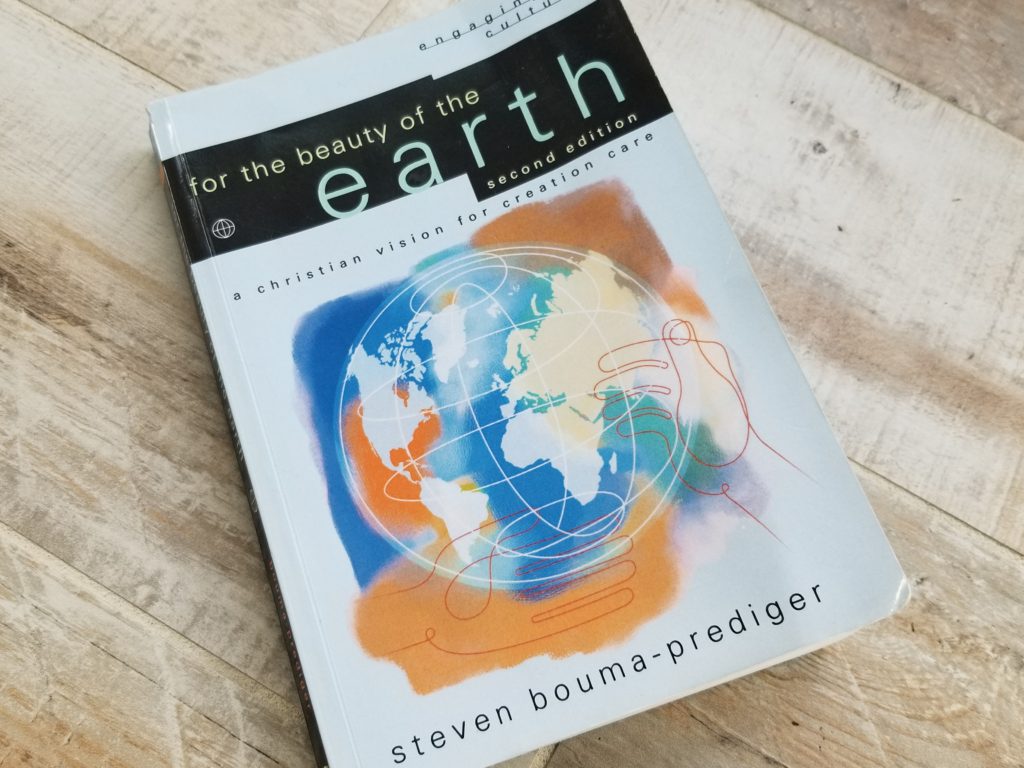
I haven’t had any animal foods for about a month, and when I came back from the conference I started talking to my family about what I was learning. We’ve been watching some of the documentaries together and they wanted to try eating plant based. So we ate plant based throughout the Memorial Day weekend, and everyone enjoyed the food and is making suggestions for swapping out plants for their favorite animal foods.
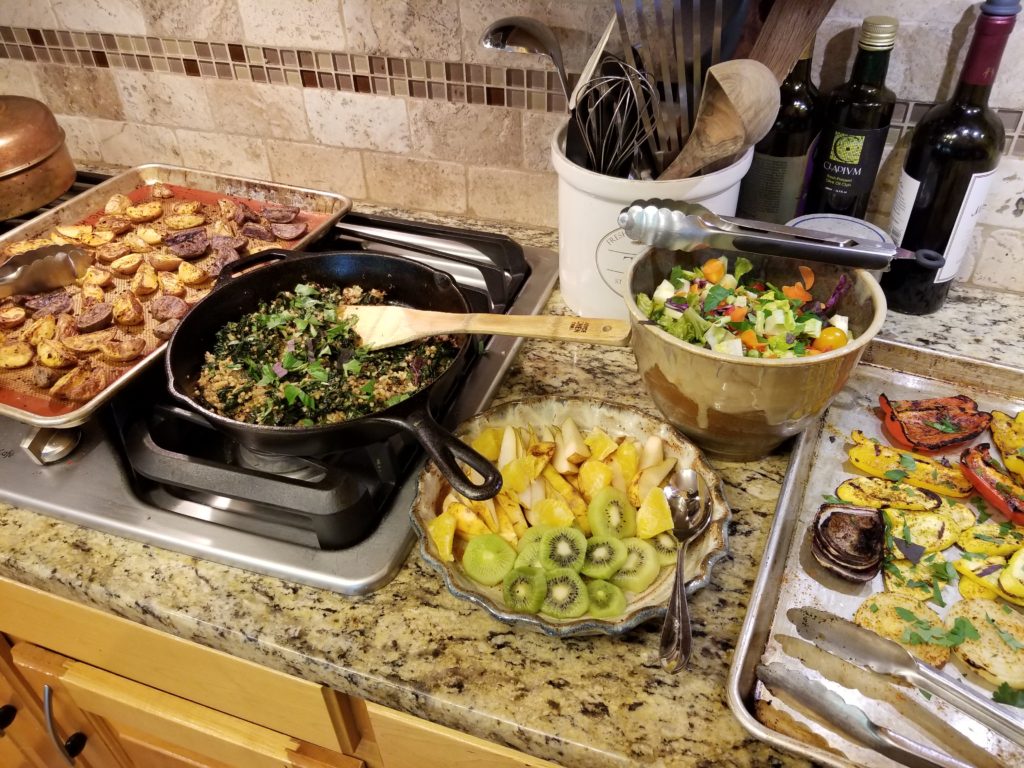
One of our plant based meals!
By the end of the conference I was convinced that yes, the health effects of a whole foods, plant based diet are clear. We all need to eat more plants and A LOT less meat, if any at all. If you have heart disease of risk factors for it (that’s a whole lot of us), if you’re African American or Latino, a whole foods plant based diet may be the diet that is healthiest. It is the one that has the medical data to support reversal of cardiovascular disease. The whole foods plant based low fat diet is the one with long term health data. If you’d like the quick look at the data, watch Forks Over Knives – you’ll get some of the info I’m talking about. The best lecture of the conference was by Dr Kim Allan Williams, the past president of the American College of Cardiologists. He’s African American, a cardiologist, an expert in his field of heart disease, and is also a vegan.
Now before the keto or paleo people come after me, remember: I’m not telling anyone what to do or to eat. I am personally evaluating what I’m doing, both for my family’s health and for the good of our communities and for the planet. There isn’t good long term health data for meat based diets – we just don’t have it yet. There also isn’t good info on differences in food quality – what if you eat organic, or get backyard chicken eggs, or get your meat from a local farmer instead of the supermarket? What about people who essentially ate organic their whole lives before we had that label and lived until they were in their 90’s? It’s hard to sort out, and nutrition science is young. But there’s no doubt that the production of animal foods is the biggest contributor to environmental destruction. We are eating ourselves out of the health of the planet we live in. If the UN statement on climate change is correct, then my kids will just be in their 20’s when climate change can no longer be stopped. Then what will we do?
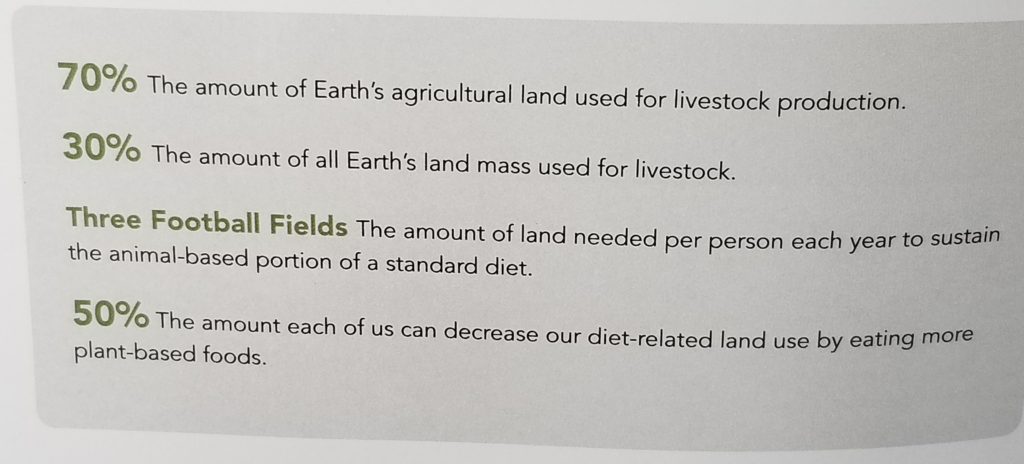
The whole thing is overwhelming. It’s enough to make me want to throw up my hands, stay on autopilot, and be in denial about the mess we’re in. But a quote from Margaret Mead keeps coming to my mind: “Never doubt that a small group of thoughtful, committed, citizens can change the world. Indeed, it is the only thing that ever has.” And there is hope! People everywhere are recognizing that a plant based diet is beneficial and are eating less meat,eggs and dairy, and if more of us do this, change can happen! As a mom, a doctor, and a concerned citizen, I want to do the best I can for the health of my family and our communities. For me, that means recycling, trying to eliminate the use of plastics, and eating mostly plants. We’re transitioning – I’m not just dumping out my deep freezer. But if I had heart disease or diabetes, I probably would do exactly that.
And as a Christian, I’m convinced that I am responsible for caring for the earth, not just taking from it, and since I think the biggest thing our family can do now to change our impact on the earth is to change the way we eat, then as Joshua said in Josh 24:15 “As for me and my household, we will serve the Lord.” And since I buy and cook most of the food, I have a lot of sway, especially in my house. So, I’m voting with my food dollar, buying lots of veggies, and feeling good about the change. I’m still not calling myself vegan though. Plant based, yes. But I’m still listening to my body, and if it comes up that I need an egg or a piece of meat, then I’ll listen. But I suspect that it won’t be just a craving, it’ll be a true need, and likely rare. If people everywhere ate meat only occasionally or as a condiment, that would greatly reduce our impact on the earth. And we can all live with that!
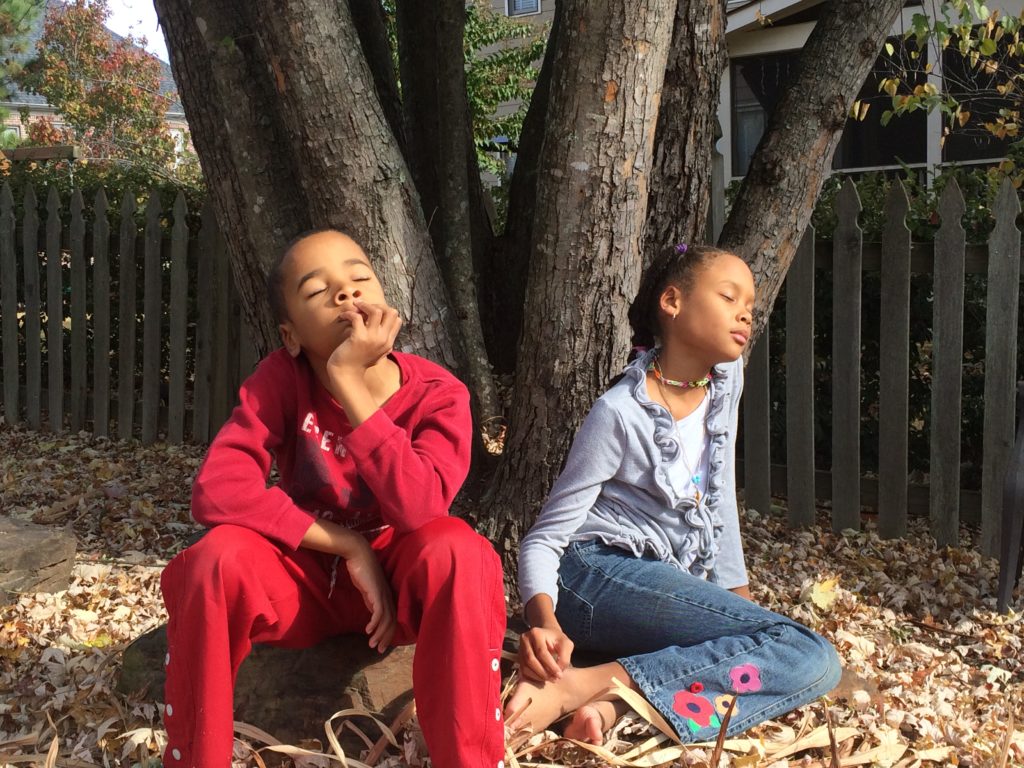
Have you ever thought about your eating style and its effect on the earth? What do you want to do next? Please share in the comments below!

Comments4
Wow. I love how you are changing and the impact you can have on just your household. Thanks for sharing.
Thank you for your support!
Yay! I love you, and your blog! Go whole foods, plant based diets!!!!
Nike
I love you too – thank you for your support!